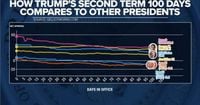As President Donald Trump reaches the 100-day mark of his second term, his approval ratings have plummeted to alarming lows, reflecting a significant shift in public sentiment. With an approval rating now at 44%, Trump stands as the only post-World War II American president to have less than half the public's support at this early stage in his presidency.
Historically, the first 100 days of a presidency serve as a crucial indicator of a leader's early momentum. This tradition, which began with President Franklin D. Roosevelt in 1933, has evolved into a symbolic milestone that captures a president's public perception and political capital. However, Trump's journey through this period has been marked by a series of controversial decisions, particularly his implementation of tariffs, which many believe have contributed to his declining popularity.
Since taking office, Trump has issued 99 executive orders, signaling a dramatic shift in governance. His administration's approach has been characterized by efforts to reduce government intervention, which critics argue disproportionately affects lower-income Americans while favoring the wealthy. "It's just been executive order, after executive order, after executive order," remarked a member of the public, highlighting the rapid changes initiated by the administration.
The announcement of unprecedented tariffs, intended to bolster American industries, has drawn widespread criticism. Observers note that these tariffs mark the end of the Western neoliberal order and are expected to inflict short-term economic pain both domestically and internationally. One public respondent expressed concern, stating, "All the other countries are looking down on America because of the policies that Trump is making. Before he got into office, we were the number one country in the world, but not anymore." This sentiment resonates with many who fear the long-term implications of Trump's trade policies.
In addition to tariffs, Trump's foreign policy decisions have also come under scrutiny. Despite his administration's focus on domestic issues, Trump continues to provide military support to Ukraine, maintaining a level of arms supply similar to that of his predecessor. Critics argue that his administration's support for Israel amidst ongoing conflicts further complicates America's international standing.
Recent polling data illustrates the stark reality of Trump's approval ratings. According to an analysis by former FiveThirtyEight editor G. Elliot Morris, Trump began his second term with a net approval rating of 7.5 points, only to see it dive to a net disapproval of 9.5 points. This shift represents the lowest net approval rating among presidents over the past 70 years, surpassing even his own first term, which was previously the lowest recorded.
Polling data reveals that Trump's approval has suffered particularly on economic issues. Initially enjoying a nearly 10-point net approval advantage in this area, he has now seen a dramatic 22-point decline. As of now, only 36% of Americans approve of his handling of the economy, with a staggering 56% disapproving. Additionally, concerns surrounding inflation have further eroded public confidence, with approval ratings dropping from 48% to 38.6%.
On immigration, an issue where Trump historically performed well, recent polling indicates a drop of 10.5 points, with approval ratings hovering around breaking even. This decline reflects a broader trend of dissatisfaction among voters, particularly among Democrats, who express a net disapproval of 86 points, and independents, who rate him down by 28 points. Conversely, Republican support remains robust, with a margin of approval at 75 points.
The latest polls from various organizations paint a complex picture of Trump's standing. A DDHQ/Decision Desk poll found that 56% of voters disapprove of his job performance, while an NPR/PBS/Marist poll revealed that 45% would give him a failing grade for his first 100 days. In stark contrast, only 23% of respondents rated him an A, highlighting a significant disconnect between his administration's goals and public perception.
In light of these challenges, Trump's response has often been to deflect criticism. On social media, he has labeled negative polling as "FAKE POLLS FROM FAKE NEWS ORGANIZATIONS," dismissing the validity of the data as politically motivated. His rhetoric suggests a belief that he remains popular among his base, despite mounting evidence to the contrary.
As the nation navigates these turbulent waters, the political landscape remains fraught with tension. Many Americans express frustration not only with Trump's administration but also with the Democratic Party's response to his policies. With midterm elections on the horizon, Democrats find themselves at a crossroads, facing disapproval ratings of their own. According to CNN, only 27% of voters approve of Democratic leaders in Congress, marking the lowest rating for the party since 2008.
The evolving political dynamics signal a potential shift in voter sentiment as the country grapples with pressing issues, including economic instability and international conflicts. Observers note that Trump's approval ratings could fluctuate in the coming weeks, influenced by key events such as negotiations in the Russia-Ukraine war and the ongoing tariff situation.
As Trump's second term progresses, the implications of his policies and public approval ratings will undoubtedly play a critical role in shaping the political landscape. The challenges he faces, coupled with a divided electorate, suggest that the path ahead will be anything but straightforward. For now, the American public watches closely, weighing the effects of Trump's actions on their lives and the nation's future.






